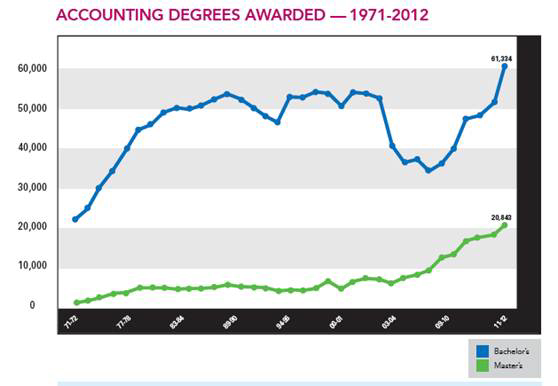Accounting
Best jobs for 2013? Demand for accountants higher than ever
College students and those considering reshaping their professional paths frequently look for lists of what the best career choices are. Well, this isn't a list, but a hard fact: Accounting graduates are among the most in-demand professionals in America today.
Jun. 22, 2013

College students and those considering reshaping their professional paths frequently look for lists of what the best career choices are. Well, this isn’t a list, but a hard fact: Accounting graduates are among the most in-demand professionals in America today.
According to a new survey by the American Institute of CPAs (AICPA), new graduates with four- or five-year accounting degrees are enjoying an unprecedented level of demand from public accounting firms, with a record 40,350 accounting graduates hired in 2012 and 89 percent of those firms forecasting the same or increased hiring of graduates this year. While four years of college is generally enough to earn a Bachelors in accounting or business administration, five years, or 150 of college credit, is required for those who want to try for the Certified Public Accountant (CPA) designation.
And for the companies and firms who need these freshly-minted accounting grads, the report showed record numbers of accounting graduates, as well as the highest number of enrollments in undergraduate and graduate accounting programs on record, indicating a thriving pipeline of accounting talent.
“A strong supply of accounting graduates is essential to serve the complex demands of a rapidly changing business environment and meet the needs of CPA firms of all sizes for top quality talent. It’s well known that the U.S. capital markets also rely on the work of CPAs to ensure that investors have access to reliable and transparent financial statements,” said Jeannie Patton, AICPA vice president, academics, professional pathways and inclusion. “The historic growth in enrollments and degrees is a testament to the attractiveness of the accounting profession and the career opportunities it provides for students.”
Overall, the 2013 Trends in the Supply of Accounting Graduates and the Demand for Public Accounting Recruits report showed a 19.7 percent increase in accounting graduates over the previous survey, with 82,177 accounting degrees awarded in the 2011-2012 school year. Both undergraduate and graduate degrees are at their highest level in the 40 years the AICPA has been conducting the survey. In addition, the 240,380 accounting enrollments for the 2011-2012 school year in both Bachelor’s and Master’s degree programs represent an all-time high and demonstrate a continued strong interest in the accounting profession as a career choice.
The results of the Trends report are consistent with the findings of the Bureau of Labor Statistics 2012-2013 Occupational Outlook Handbook, which found that employment of accountants and auditors is expected to grow 16 percent from 2010 to 2020, representing an additional 190,700 jobs. The BLS Handbook notes that candidates with professional recognition, such as a CPA, as well as those with Master’s degree in accounting have an advantage in the job market. The Trends report found that the number of accounting students graduating with Master’s degrees has more than doubled in the last ten years, and that 41 percent of accounting graduates hired by public accounting firms in 2012 had graduate degrees, echoing the BLS findings.
“Employers are increasingly looking to hire CPAs with advanced degrees, as they have the education and skills necessary to work in an increasingly complex, global business environment,” said Patton. “The best way to ensure that the profession has the necessary talent to fill these positions is to recruit the best and brightest young minds from the entire talent base available and make certain we work to retain them.”
The percentage of enrollments by ethnicity in the 2011-2012 academic year saw increases across the board compared to 2009-2010, the last time AICPA conducted the survey. Minority enrollment reached 33 percent at the BA level, up from 23.4 percent. Minorities comprised 38 percent of enrollments in Master’s programs, an increase from 21.6, and minority enrollment in Ph.D. programs totaled 34.4 percent, greater than the 27.8 percent in the previous report. In addition, the 2013 Trends report found that minorities comprised 25 percent of employees at public accounting firms, up from 21 percent during the previous survey. Minority representation at the partner level increased to 10 percent, up from the 6 percent reported in the last survey.
“While gains in the percentage of minority enrollments, graduates, employees and partners since the last survey are encouraging, the National Commission on Diversity and Inclusion will continue to work to find solutions to the declining trajectory of minorities in the accounting profession by focusing on retention and advancement,” said Kim Drumgo, director of diversity and inclusion at the AICPA.
The AICPA has two programs, Start Here, Go Places. and This Way to CPA, to educate students on the possibilities of a career in accounting and provide them with resources and guidance as they enter the profession. In addition, the AICPA offers many scholarship opportunities for accounting students throughout their academic careers.
